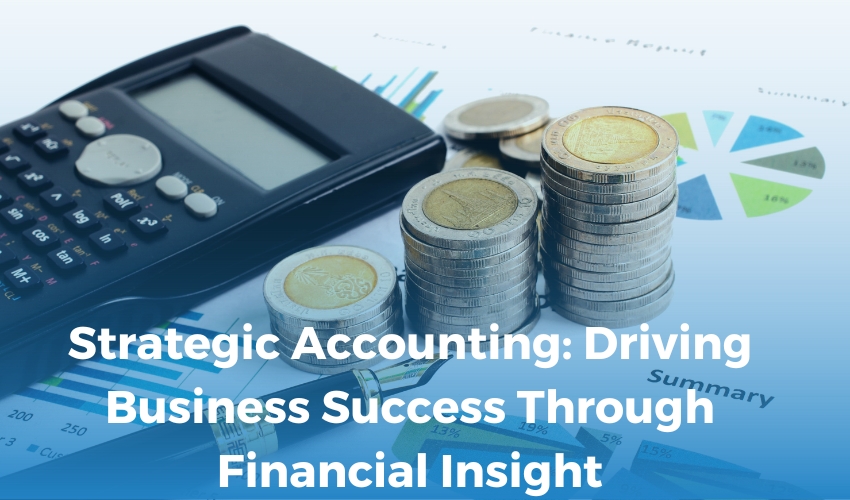

28-11-23
In the dynamic landscape of modern business, strategic accounting emerges as a cornerstone for organizations aiming not just for survival, but for sustained success. Beyond the conventional roles of number crunching and financial reporting, strategic accounting delves into the realm of proactive financial management, offering invaluable insights that drive key business decisions. This article explores the pivotal role of strategic accounting in steering businesses toward success through informed financial decision-making.
Understanding Strategic Accounting
Strategic accounting goes beyond the traditional view of accounting as a mere record-keeping function. While accurate financial records remain fundamental, strategic accounting elevates the role of the accountant to that of a strategic partner in business operations. It involves the analysis and interpretation of financial data to provide actionable insights that contribute to the overall success and growth of the organization.
Financial Insight as a Competitive Advantage
In the competitive business landscape, information is power. Strategic accounting transforms financial data into actionable insights, giving businesses a competitive advantage. By understanding the financial health of the organization, decision-makers can make informed choices that align with long-term goals and mitigate risks.
Budgeting and Forecasting: Anticipating Future Scenarios
One of the key aspects of strategic accounting is effective budgeting and forecasting. Rather than being a routine annual exercise, these become dynamic tools for anticipating and adapting to changing market conditions. By employing sophisticated financial models, businesses can simulate various scenarios, enabling them to make decisions that position them ahead of the curve.
For instance, a manufacturing company might use strategic accounting to forecast the impact of raw material price fluctuations on production costs. Armed with this foresight, the company can explore alternative suppliers, negotiate contracts, or adjust pricing strategies to maintain profitability in the face of changing market conditions.
Risk Management: Navigating Uncertainty
Every business faces uncertainties, but strategic accounting empowers organizations to identify, assess, and mitigate risks effectively. By conducting thorough risk assessments and stress-testing financial models, businesses can develop contingency plans that prepare them for various scenarios.
In the world of finance, risks come in various forms: market fluctuations, regulatory changes, economic downturns, and more. Strategic accounting ensures that businesses not only understand these risks but also have strategies in place to respond swiftly and effectively, minimizing potential negative impacts.
Profitability Analysis: Maximizing Returns
Strategic accounting involves a deep dive into the profitability of different aspects of the business. By conducting comprehensive profitability analyses, organizations can identify high-performing products, services, or market segments and allocate resources strategically. This insight enables businesses to focus on what works best, enhancing overall profitability.
Consider a retail business using strategic accounting to analyze the profitability of its product lines. By identifying the high-margin products and understanding the factors contributing to their success, the business can make informed decisions about resource allocation, marketing strategies, and inventory management, ultimately driving greater overall profitability.
Strategic Planning: equivalent Business and Financial Objectives
Successful businesses are guided by a clear vision and strategic plan. Strategic accounting plays a pivotal role in aligning financial goals with broader business objectives. By integrating financial analysis into strategic tax planning, organizations can ensure that their financial resources are allocated in a manner that supports their long-term vision.
For instance, a tech startup may use strategic accounting to assess the financial implications of different growth strategies—whether to invest in research and development, expand into new markets, or optimize existing operations. This analysis enables the leadership team to make informed decisions that align with the company's overarching goals.
Technology's Role in Strategic Accounting
The advent of advanced technologies has revolutionized the field of accounting. Strategic accounting leverages these technologies, including data analytics, artificial intelligence, and machine learning, to process vast amounts of financial data quickly and accurately. This not only enhances the efficiency of accounting processes but also provides a wealth of data for strategic decision-making.
For example, data analytics tools can analyze customer purchase patterns, helping businesses tailor their marketing strategies to specific demographics. This level of targeted marketing not only improves customer engagement but also optimizes the allocation of marketing resources, contributing to the overall efficiency and profitability of the business.
Conclusion
In conclusion, strategic 360accounting services are a powerful driver of business success in the modern era. By moving beyond the traditional role of accounting and embracing a strategic mindset, organizations can harness financial insights to navigate uncertainties, capitalize on opportunities, and drive long-term growth. As businesses continue to evolve, those that prioritize strategic accounting as a fundamental aspect of their operations will find themselves well-positioned to not only survive but thrive in the competitive landscape. Strategic accounting is not just about numbers; it's about using financial insight as a catalyst for informed decision-making, ultimately steering the business toward sustained success.
Tags :













































.jpg)
.jpg)
.jpg)
.jpg)


).jpg)














 Get A Quote
Get A Quote
Leave A Comment